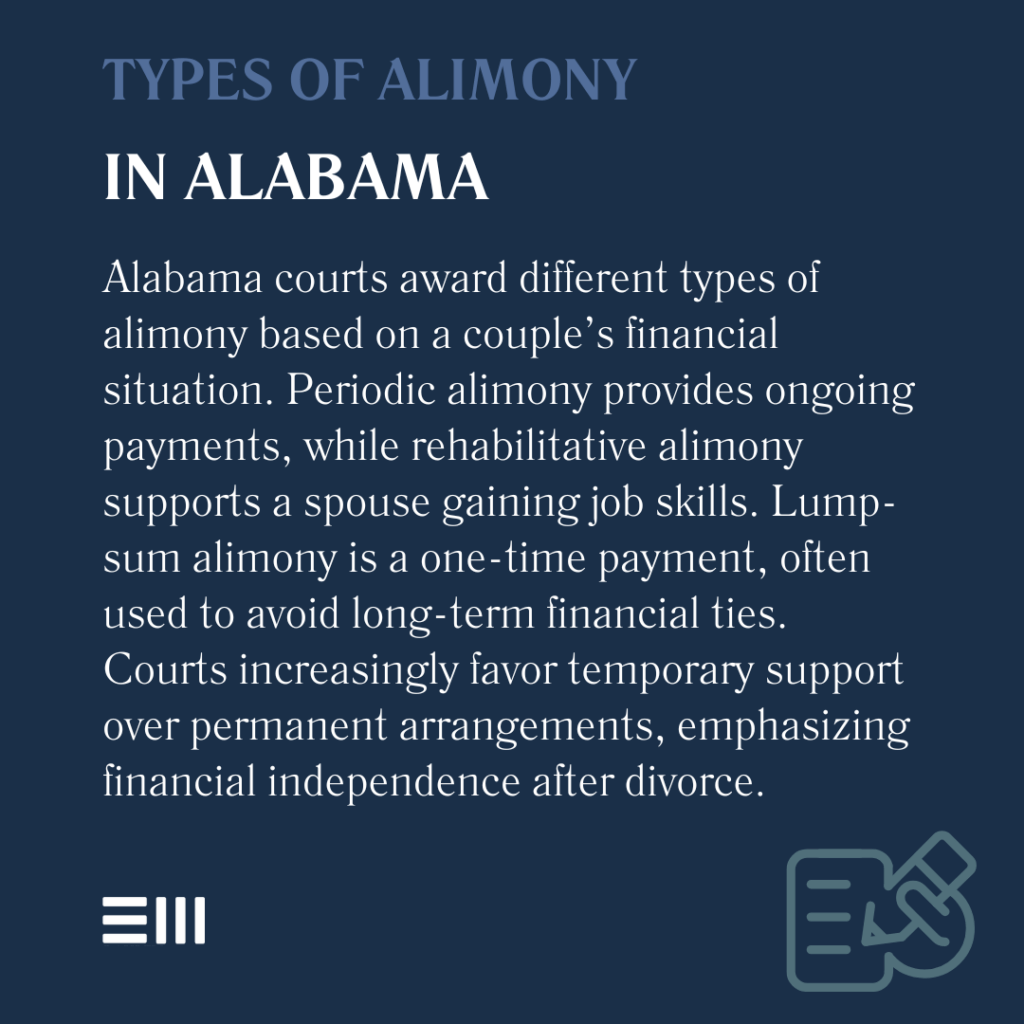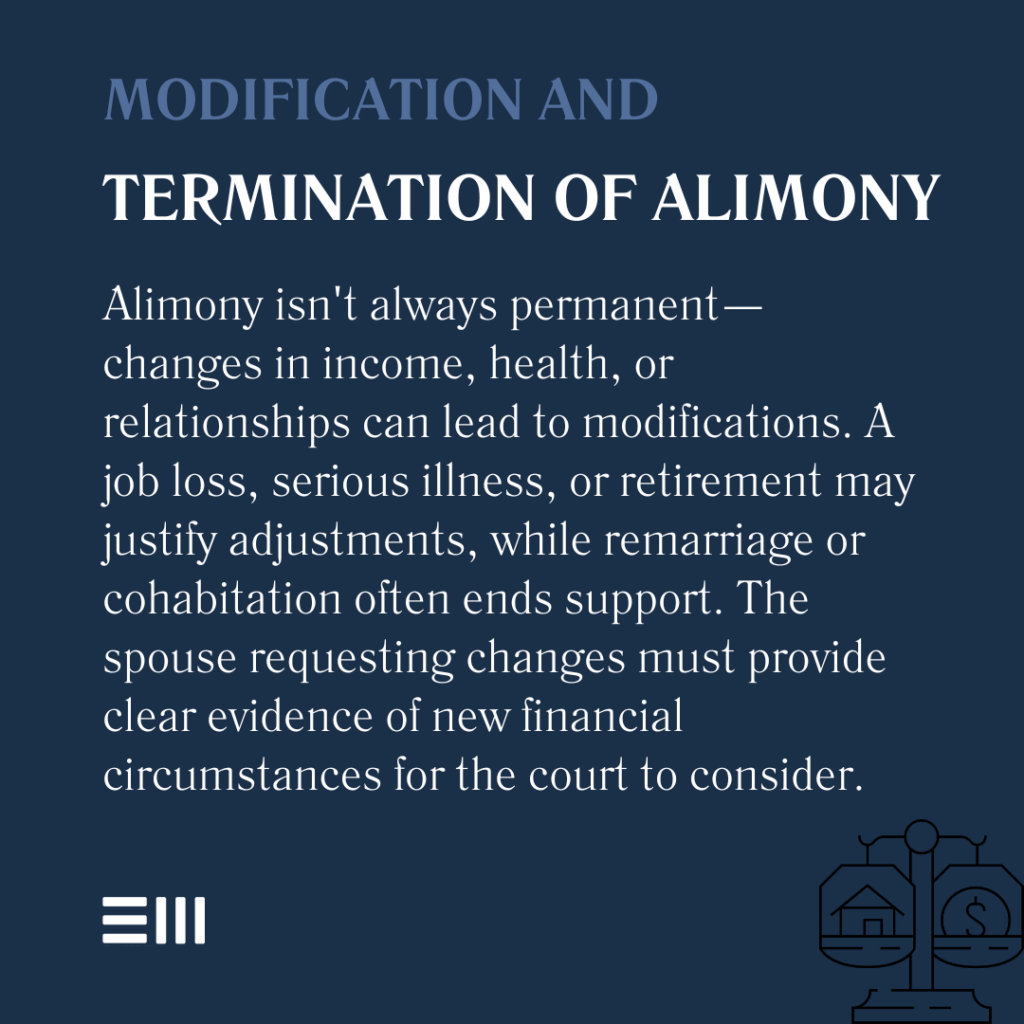
Behind every Alabama divorce lies a story of financial uncertainty. For many Alabama residents, alimony becomes the bridge between their married life and an independent future.
Whether facing the prospect of making payments or hoping to receive support, the decisions made about alimony shape the foundation of post-divorce life.
From determining fair payment amounts to understanding duration and modification rights, navigating Alabama’s alimony laws requires careful consideration of both immediate needs and long-term financial security.
Types of Alimony in Alabama
Alabama recognizes several distinct types of alimony, each serving different purposes and circumstances. Understanding these variations helps individuals better prepare for their specific situations.
Periodic alimony serves as the most common form in Alabama, typically involving regular payments for an indefinite period.
Rehabilitative alimony provides temporary support while the receiving spouse gains education or job skills.
Lump-sum alimony consists of a one-time payment, often used in situations where ongoing contact between former spouses proves challenging.
In recent years, Alabama courts have increasingly favored rehabilitative alimony over permanent arrangements, reflecting a modern emphasis on financial independence post-divorce.

Factors Determining Alimony Awards
Alabama courts carefully weigh numerous factors when determining alimony awards. These considerations help ensure fair and appropriate support arrangements for both parties.
The court examines:
- Length of the marriage;
- Standard of living established during marriage;
- Age and health of both parties;
- Earning capacity of each spouse;
- Contribution to the marriage, including homemaking;
- Sources of income for both parties;
- Property division in the divorce;
- Future employment prospects;
- Child custody arrangements and their impact on earning ability; and
- Tax consequences of the alimony award.
Each case receives individual consideration based on its unique circumstances, with judges maintaining significant discretion in their final determinations.
Modification and Termination of Alimony
Life changes often necessitate adjustments to existing alimony arrangements. Alabama law provides mechanisms for modifying or terminating alimony under specific circumstances.
Common grounds for modification include:
- Significant change in income;
- Serious illness or disability;
- Retirement;
- Remarriage of the receiving spouse;
- Cohabitation with a romantic partner; and
- Substantial inheritance or windfall.
The burden of proof falls on the party requesting modification to demonstrate material changes in circumstances warranting adjustment.
Courts typically require clear documentation of changed circumstances, such as medical records for health-related claims or employment termination notices for income changes.
Modifications can be temporary or permanent, depending on the nature of the change in circumstances. For instance, temporary job loss might warrant a temporary reduction, while permanent disability could justify long-term modification of the agreement.

Tax Implications and Financial Planning
Recent federal tax law changes have significantly impacted how alimony payments affect both parties’ financial situations.
Understanding these implications proves essential for proper financial planning.
Key considerations include:
- Alimony payments no longer tax-deductible for the paying spouse;
- Receiving spouse no longer reports alimony as taxable income;
- Impact on retirement account divisions;
- Effect on mortgage applications and other lending; and
- Insurance considerations post-divorce.
Professional financial guidance often proves valuable in navigating these complex tax and planning considerations.
Documentation and Evidence
Proper documentation plays a vital role in alimony proceedings and modifications. Alabama courts require clear evidence to support claims about financial needs and abilities to pay.
Essential documentation includes:
- Complete tax returns from the past three years;
- Pay stubs and income verification;
- Bank statements showing regular expenses;
- Medical records if health impacts earning capacity;
- Professional evaluations of earning potential;
- Evidence of job search efforts if unemployed; and
- Records of marital lifestyle and expenses.
Maintaining organized financial records throughout the marriage helps strengthen positions during alimony negotiations. Courts particularly value documentation that shows consistent patterns of income and expenses over time.
Common Questions About Alabama Alimony
Understanding alimony requirements and regulations helps individuals better prepare for their divorce proceedings.
Here are answers to frequently asked questions about Alabama alimony laws.
How Long Does Alimony Last in Alabama?
Alabama courts determine alimony duration based on individual circumstances, particularly marriage length. Short-term marriages typically result in shorter alimony periods, while long-term marriages may warrant longer or permanent support.
What Factors Affect Alimony Amount?
Courts consider multiple factors, including income disparity, standard of living during marriage, earning potential, and length of marriage when determining alimony amounts.
Can Alimony Be Modified After Divorce?
Yes, either party can petition for modification when significant changes in circumstances occur, such as job loss, illness, or retirement.
Does Remarriage End Alimony Obligations?
Receiving spouse’s remarriage typically terminates alimony, but paying spouse’s remarriage usually doesn’t affect obligations.
How Does Cohabitation Impact Alimony?
Cohabitation with a romantic partner may lead to termination of alimony if the receiving spouse shares living expenses or receives financial support from the new partner.
Take Control of Your Financial Future
Don’t let uncertainty about alimony impact your path forward. Our experienced team understands the complexities of Alabama alimony laws and stands ready to protect your financial interests.
Contact Baxley Maniscalco today for a confidential consultation. Let us help you secure the fair and appropriate alimony arrangement you deserve.
Can't find what you're looking for? Search our site below.










